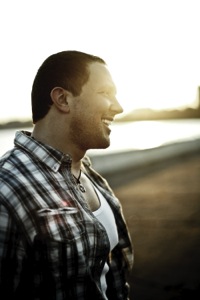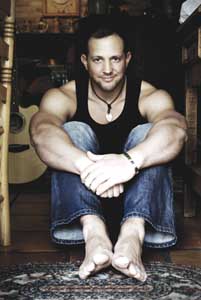
Growing up gay in the Mormon community gave up-and-coming alt-country musician Justin Utley a unique perspective. After spending two unsuccessful years in church-run ex-gay therapy, he split from the church in 2005 and moved to New York City to pursue a music career. Utley’s second CD, Nothing This Real, chronicles his journey.
Abby Walker: How is your new CD different from your previous music?
Justin Utley: It’s more honest. I think I was more reserved on my previous album because I hadn’t come out. I had to be more ambiguous in my lyrics and I felt like I didn’t want to be pigeon-holed as a gay artist. This time around I wanted to be more direct in my lyrics but still leave it open enough that people can relate to it on their own level. I wanted to write from my heart about my own experiences.
How did you get your start in country music?
I had just finished a run of the Broadway show, Our Country, here in New York that was about an outed gay country superstar. The reviews said, “Justin Utley, a country singer,” so I was dubbed a country singer before I actually even considered myself much of a country artist. But in comparison with a lot of other music out there in the genre, I guess you could say that I’m a country crossover artist.
Did you grow up listening to country music? Who are your musical influences?
Being from Utah in the western side of Salt Lake Valley, our high school had a rodeo club and a lot of cowboys. I grew up with country music but a lot of my influences were also a lot of alt-rock like Pearl Jam. I got into some of the crossovers like Sheryl Crow, Dixie Chicks.
What was your first big break?
I’d been doing some high school musicals. This is what broke me out of the Mormon music scene and into the more mainstream markets. When I was in a seven month run of Joseph and the Amazing Technicolor Dreamcoat in Utah it got noticed by the governor’s office so when the 2002 Olympics came around they asked me to be one of the featured performers in some of the ceremonies and parties. That was pretty cool and that brought me some attention outside of Utah. I started flying out to New York to do some fundraising and I felt like, “Wow, New York is the place to be.” I think the last people to make it big while living in Utah were the Osmonds. I felt like I needed to make a break and move from Utah to New York.

What is the number one highlight in your musical career?
It’s a tie. The first would be performing for Stockholm Pride last year before an audience of at least 10,000 people. It was amazing. To know that I connected to people halfway across the world, people were singing along, people were blogging about it afterward. It was humbling and an experience that I’ll never forget. Plus, it was great being in Sweden and seeing their acceptance of LGBT equality on every issue, on every level. It wasn’t just gay pride; it was more about celebrating equality for everybody. That was very eye-opening for me.
The other one is that last December, the It Gets Better program asked me to perform at their holiday concert along with their leads from the Book of Mormon musical and Wicked. They asked me to perform my single “Stand for Something.”
Can you tell us more about “Stand for Something?”
I had written a basic version years ago. When Prop. 8 happened, I was very upset and not in an angry kind of way but in a passionate kind of way. The rights of individuals should never be on a popular ballot. But I felt like if enough people would have just gotten off their asses and voted, it would have made a huge difference because it passed by such a small margin. I had to put this passion that I had onto paper and into a song. I pulled the song and rewrote most of the music and lyrics and put it together in the wake of Prop. 8 as a banner call for not just LGBT equality but also youth homelessness and suicide and anything that you can apply the stand for something message to.
What was it like growing up in Utah in the Mormon community?
It was quite the ride. I was raised in a very conservative Mormon household. We went to church every Sunday. Most of the people I went to church with went to my same elementary, junior high and high school so if you didn’t go to church on Sunday or drank a bottle of iced tea, one would know and it would probably get back to your parents.
When I realized that I was gay after my mission, I went into ex-gay therapy for two years. I didn’t know of anyone else who was in my situation because it was on the down low. Through my experience in ex-gay therapy, the reason people are hush-hush about it is because it’s treated like a disorder or a disease. It’s caused by something that happened to you in your childhood or there’s something biologically wrong with you that can be medicated. When I finally realized after two years that it wasn’t working and wouldn’t work, I experienced what it was like to live on the outside of that social Mormon experience.
What was your experience like at the 2011 San Diego Pride?
It was a very cool experience. You guys put on a really great Pride. The fact that it was in Balboa Park was pretty amazing. Some of the other Prides that I’ve been to have been in a parking lot, but Balboa Park was a beautiful setting. I met a lot of people in the straight community who were very supportive of LGBT rights and LGBT equality. I think I met more straight people than gay people, which was very cool to see. I’d love to come back this year.











WOW. Gorgeous guy.. and a pretty amazing story. Buying his album now.
This is a great post, I think you should turn it into a 2 or 3 part series.